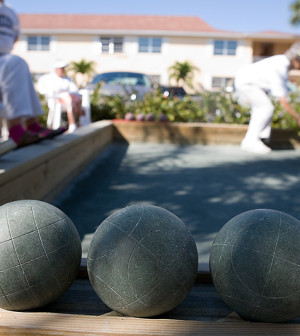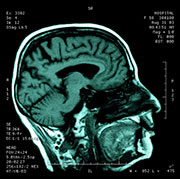- Could Your Grocery Store Meat Be Causing Recurring UTIs?
- Are You Making This Expensive Thermostat Error This Winter?
- Recognizing the Signs of Hypothyroidism
- 10 Strategies to Overcome Insomnia
- Could Artificial Sweeteners Be Aging the Brain Faster?
- Techniques for Soothing Your Nervous System
- Does the Water in Your House Smell Funny? Here’s Why
- Can a Daily Dose of Apple Cider Vinegar Actually Aid Weight Loss?
- 6 Health Beverages That Can Actually Spike Your Blood Sugar
- Treatment Options for Social Anxiety Disorder
Electrical Pulses to Scalp May Boost Memory: Study


Scientists have found that sending electrical currents through the scalp to a specific network of brain structures can enhance people’s memories, for up to a day.
In a small study of healthy young adults, researchers used transcranial magnetic stimulation (TMS) to fire up certain networks involved in memory. That, in turn, boosted participants’ performance on memory tests — an improvement apparent 24 hours after the brain stimulation.
During TMS, an electromagnetic coil is placed on the scalp to create electrical currents that stimulate brain cells. In the United States, the procedure is approved for hard-to-treat cases of depression that don’t improve with standard treatments.
Experts stressed, however, that no one should seek out TMS to get better grades or to treat memory loss.
“This study is really a proof-of-concept,” said senior researcher Joel Voss, an assistant professor at Northwestern University Feinberg School of Medicine in Chicago.
“It will take a lot more development before this could be used therapeutically,” Voss said.
The study, which appears in the Aug. 29 issue of Science, included 16 healthy adults aged 21 to 40. All underwent MRI scans to pinpoint a network of brain cells right below the skull that are well connected with the hippocampus — a structure deep in the brain that is key in memory.
The researchers hoped that by stimulating those superficial brain structures with TMS, they could rev up the hippocampus and improve people’s memories.
To test that idea, Voss’s team had the study participants take a test of associative memory, where they had to learn and remember a set of arbitrary associations between faces and words. The men and women then received 20 minutes of TMS every day for five consecutive days.
After three days, the researchers found, test performance started to improve. The gains were still there when the participants took the test 24 hours after the final TMS session.
It wasn’t just a matter of the test-takers getting better over time, according to the researchers. On a separate week, study participants all had “placebo” TMS — with no real brain stimulation — and their test performance did not improve.
“This is a really interesting study,” said Mary Sano, director of the Alzheimer’s Disease Research Center at the Mount Sinai Icahn School of Medicine in New York City.
According to Sano, the results help identify the “pathways of memory consolidation” in the healthy brain. “That kind of basic knowledge is very important to understanding what goes wrong in disease,” she said.
But she agreed that years of research remain before TMS could potentially be used to either treat memory problems — from Alzheimer’s disease, stroke or other brain disorders — or to give healthy people a memory boost.
“Everybody probably has a desire to gain more control over their memory,” Sano noted. But she said researchers have much to learn about whether there are safe, feasible ways to do that.
As for TMS, specifically, Voss said it’s “remarkable” that a few sessions were able to improve memory performance — even in people with no impairments. “It’s amazing that the brain is so plastic,” he said, referring to the brain’s capacity to change.
“But,” Voss stressed, “we have a lot to learn, in terms of safety and effectiveness. We don’t even know if (in someone with a brain disorder) this would have benefits, or possibly make things worse.”
Based on what’s known from depression treatment, TMS is relatively safe. The main side effects are a short-lived headache and scalp discomfort. There also appears to be a small risk of seizure.
Right now, TMS is pricey. When it’s used for depression, one session typically costs around $300. And there is no MRI involved, whereas, if TMS were used for memory problems, an MRI would be needed to zero in on the brain networks connected to the hippocampus.
The precise location of those networks varies from person to person, Voss explained.
His team is planning a study of TMS in older adults in the early stages of memory loss. “Within about five years, we should have an idea of whether it’s potentially useful,” Voss said.
More information
The Alzheimer’s Association has more on memory loss.
Source: HealthDay
Copyright © 2026 HealthDay. All rights reserved.










